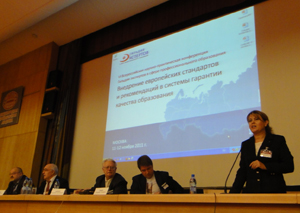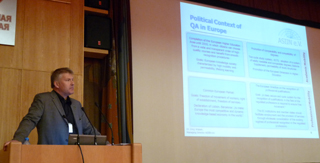The Sixth Annual Conference of Experts in Higher Education "Implementation of the European Standards and Guidelines for Quality Assurance Systems" took place in Moscow on 11-12 November 2011.
The 2011 Conference of Experts in Higher Education, an annual event co-organized by the Russian National Guild of Experts in Higher Education and the National Center of Public Accreditation (NCPA) was held in Moscow, Russia, on 11-12 November 2011.  This year the conference was addressed to the representatives of quality assurance agencies, researchers, academics, policy makers, administrators and educators, both from Russia and abroad. Peers from CEENQA member agencies were explicitly invited to take part in the event. Representatives of Czech Accreditation Commission, Slovak Accreditation Commission, Estonian Higher Education Quality Agency, Croatian Agency for Science and Higher Education as well as from the National Accreditation Center of the Ministry of Education and Science of the Republic of Kazakhstan came to Moscow to exchange knowledge, ideas and experience, to discuss and compare various aspects of the Bologna Process implementation in different national contexts, as well as to identify solutions to existing challenges common to most European countries.
This year the conference was addressed to the representatives of quality assurance agencies, researchers, academics, policy makers, administrators and educators, both from Russia and abroad. Peers from CEENQA member agencies were explicitly invited to take part in the event. Representatives of Czech Accreditation Commission, Slovak Accreditation Commission, Estonian Higher Education Quality Agency, Croatian Agency for Science and Higher Education as well as from the National Accreditation Center of the Ministry of Education and Science of the Republic of Kazakhstan came to Moscow to exchange knowledge, ideas and experience, to discuss and compare various aspects of the Bologna Process implementation in different national contexts, as well as to identify solutions to existing challenges common to most European countries.  Special interest among the conference attendees was generated by the presentation Bologna 2020 – New Developments in European Quality Assurance, made by Dr. Iring Wasser, CEENQA President, Managing Director of ASIIN (Germany). Dr. Wasser’s presentation gave the conference participants a new perspective on such aspects as the political context of QA in Europe, academic and professional mobility, learning outcomes and competence profiles, quality labels, roles of different players in the field of European QA.
Special interest among the conference attendees was generated by the presentation Bologna 2020 – New Developments in European Quality Assurance, made by Dr. Iring Wasser, CEENQA President, Managing Director of ASIIN (Germany). Dr. Wasser’s presentation gave the conference participants a new perspective on such aspects as the political context of QA in Europe, academic and professional mobility, learning outcomes and competence profiles, quality labels, roles of different players in the field of European QA.
During two days of plenary sessions and panel discussions, various aspects of the implementation of the Bologna reforms in national and European contexts were discussed including student and employer involvement in quality assessment of higher education, the role of quality assurance agencies in the Bologna reforms, use of testing for quality assessment in higher education, methodological and organisational aspects of the review processes, best practices of ECTS introduction, use of Internet for quality enhancement in higher education, etc. (The programme can be found here).
The conference brought together 125 higher education and quality assurance stakeholders to discuss the latest developments and trends in quality assurance.
The conference participants concluded that the event provided an excellent platform for information exchange, constructive interaction and networking opportunities among colleagues and professionals from Russia and CEENQA member agencies. The organizers highly appreciate the contribution of CEENQA colleagues to the success of the event and look forward to seeing them next year.
More on http://www.expert-nica.ru

